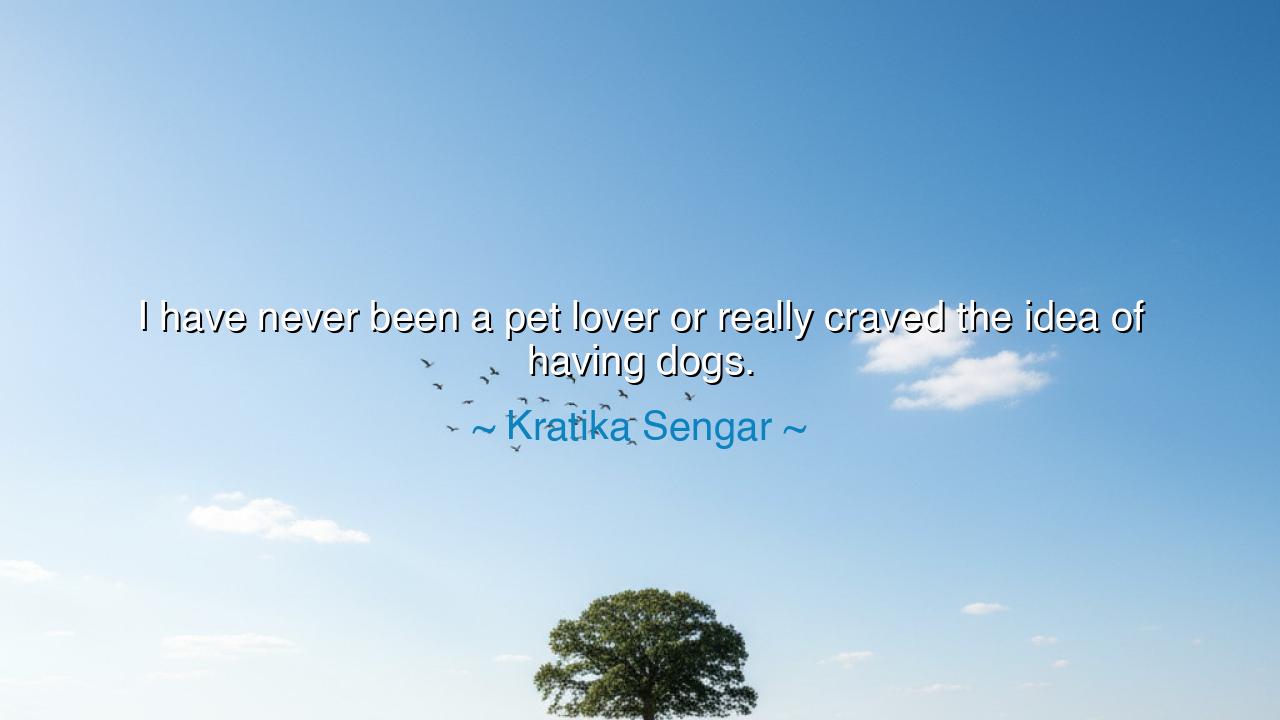
I have never been a pet lover or really craved the idea of






Hear now the words of Kratika Sengar, who declared with candor: “I have never been a pet lover or really craved the idea of having dogs.” To some, this confession may sound cold in a world where many hearts are softened by the loyalty of animals. Yet within these words lies not cruelty, but truth—the truth that love wears many forms, and that not every spirit is drawn to the same bonds. For to admit what one does not desire is an act of honesty, and honesty is a virtue greater than pretense.
In the age of the ancients, philosophers spoke of the diversity of souls. One found delight in the harmony of music, another in the pursuit of knowledge, another still in the care of creatures. Yet no single love could be forced upon all, for the soul’s path is carved by its own temperament. Thus, Kratika’s words remind us that not all are called to find companionship in animals; some are drawn instead to the service of people, to craft, to duty, or to the inner life of the spirit. To deny this truth and feign affection would be to walk in falsehood.
Consider the tale of Marcus Aurelius, the Roman emperor and Stoic sage. He was surrounded by men who gloried in gladiatorial games with beasts, who adored their hounds and horses. Yet Marcus, while respecting their affections, often turned his heart toward philosophy and the governance of men rather than the keeping of animals. His legacy shows that greatness is not measured by the love of all things, but by the devotion to that which one is truly called. In the same way, Kratika’s words are not a rejection of life, but a declaration of where her devotion lies.
And yet, these words teach us more: they remind us of the folly of judgment. Too often men condemn others for not sharing their passions, as though one who does not love dogs has failed in tenderness. But the truth is otherwise. The heart has many chambers, and some are filled not with affection for pets but with other noble loves—love of art, of kin, of learning, of service. To force all hearts into one mold is to break them. Wisdom calls us instead to honor the diversity of human affection.
O listener, do not think this saying diminishes the value of animals. Rather, it elevates the value of honesty. If one does not feel called to keep a pet, it is better to admit it than to take a creature into one’s home without the true desire to care for it. For to keep an animal without love is to betray it, but to refrain is to protect both it and oneself. Thus, Kratika’s confession is not a denial of compassion but a form of responsibility.
The lesson is plain: do not despise yourself for the loves you do not carry, nor despise others for their differences. Instead, seek to know your own heart with clarity. If you love animals, cherish them and tend to them faithfully. If not, then serve life in another way—with equal devotion, with equal care. Let each soul pour itself where it is meant to flow, and together the rivers of humanity will nourish the earth.
Practical action follows: before taking any responsibility—whether of pets, of people, or of work—ask yourself if your heart truly desires it. If it does, embrace it fully. If it does not, have the courage to refrain. In this way, you will live honestly, without burdening others or yourself. Remember always, it is not necessary to love what others love; it is only necessary to love sincerely what is yours to love.
Thus, in the words of Kratika Sengar, we are reminded of the sacred power of honesty. She does not crave the companionship of dogs, but in this truth lies freedom—for herself, for the animals, and for all who would follow her example of candor. O seeker, walk with such honesty, and you too shall find peace in loving rightly, and in living faithfully to your own soul’s design.






AAdministratorAdministrator
Welcome, honored guests. Please leave a comment, we will respond soon